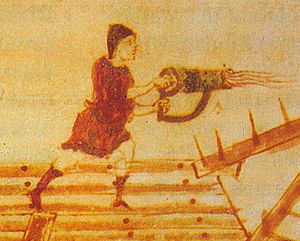Rus'–Byzantine War (1043) facts for kids
Quick facts for kids Russo-Byzantine war 1043 |
|||||||
|---|---|---|---|---|---|---|---|
|
|||||||
| Belligerents | |||||||
| Byzantine empire | Kievan Rus' | ||||||
| Casualties and losses | |||||||
| unknown | 5000+ killed, 800 captured | ||||||
The final Byzantine–Rus' War was a naval attack on Constantinople in 1043. It was started by Yaroslav the Wise, a powerful ruler of the Kievan Rus'. His oldest son, Vladimir of Novgorod, led the attack. However, the raid was not successful for the Rus' forces.
Historians don't fully agree on why this war happened or exactly how it played out. One person who saw the battle, Michael Psellus, wrote that the Byzantine fleet completely defeated the Rus' invaders. He said they used a special weapon called Greek fire. Other old stories from the Slavonic people say that a big storm destroyed the Rus' fleet instead.
The Byzantines sent 14 ships to chase the scattered Rus' boats, which were called monoxyla (small, single-masted boats). A Rus' admiral named Ivan Tvorimich managed to sink these Byzantine ships. He also rescued Prince Vladimir after his own ship was wrecked. The famous Varangian Guard, a group of elite Viking warriors serving the Byzantine Emperor, was also involved in the fighting. About 6,000 Rus' soldiers, led by Vyshata, were captured. They had not taken part in the sea battle. These prisoners were sent to Constantinople. Sadly, eight hundred of these captured soldiers were severely punished.
Three years later, a peace treaty was signed. Vyshata was allowed to go back home to Kiev. As part of the peace deal, Yaroslav's son, Vsevolod I, married a daughter of the Byzantine Emperor, Constantine Monomachus. Vsevolod's son, who was born from this marriage, was named Vladimir Monomakh. He took his grandfather's name.
The Crimean Campaign: Did the War Continue?
Some historians believe the war didn't end in 1043, as Greek records suggest. They think the Rus' might have captured a city called Chersonesos (also known as Korsun') in Crimea the next year.
Evidence for a Continued Conflict
There are several reasons why some experts think the fighting went on:
- Old Stories: A writer from the 1500s, Maciej Stryjkowski, wrote that Yaroslav sent his son Vladimir to take over Greek trading cities in Crimea, especially Chersonesos.
- Novgorod Traditions: People in Novgorod have old stories linking Vladimir's building of the Saint Sophia Cathedral in Novgorod in 1045 to a victory over the Greeks. The cathedral used to have a special collection called the Korsun Treasure. People believed Prince Vladimir brought it from Korsun'. This treasure included a famous copper gate, which was said to be a city gate from Chersonesos. This gate has unique cross symbols that match those found in Chersonesos. Also, digging in Chersonesos found a note saying the city gate had to be replaced in 1059. The treasure also had gold items and a special religious painting called the Theotokos of Korsun.
- Saint Clement's Relics: In 1048, a visitor to Kyiv named Roger II of Châlons said he saw the relics (remains) of Saint Clement of Rome there. Roger reported that Yaroslav told him he had taken these relics from Chersonesos. Old Slavonic writings say that Yaroslav's father, Vladimir the Great, brought Clement's relics to Kiev from Crimea.
A New Look at the War
After looking at all these facts, a historian named Vera Bryusova suggested something new. She believes that the fighting started again in 1044 or 1045. She thinks Vladimir attacked and captured Chersonesos. The Byzantines were busy with other wars, so they agreed to a good peace deal with the Rus'. This deal included giving a princess in marriage to Vladimir's younger brother.
If this is true, it would be very similar to when Vladimir the Great conquered Chersonesos. That event, according to most Slavonic stories, led to the Christianization of Kievan Rus' in 988.
Bryusova also thinks that later stories might have mixed up Vladimir of Novgorod with his more famous grandfather, Vladimir the Great. Vladimir the Great probably didn't fight wars against Byzantium. Some writers even wrongly said that Monomakh fought this Crimean campaign. But Monomakh actually had strong support from Constantinople.
 | James B. Knighten |
 | Azellia White |
 | Willa Brown |


